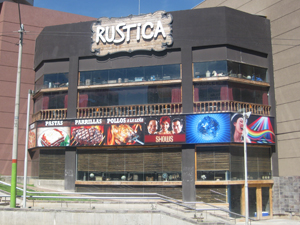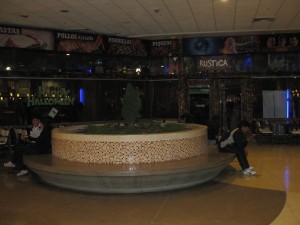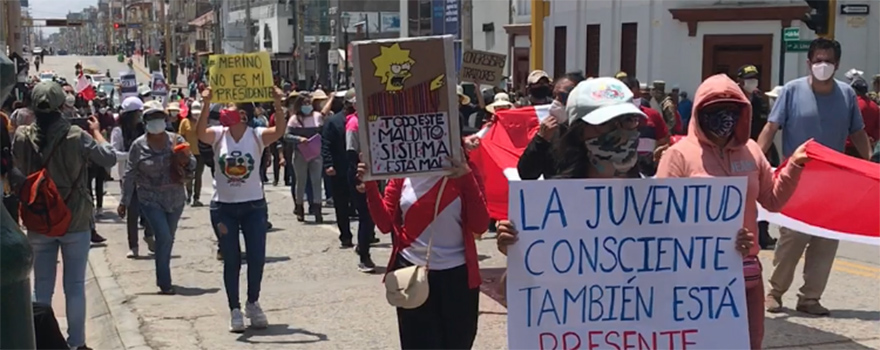Third time’s a charm, they say. And we may have actually found a winner with the third Peruvian president within a week – Francisco Sagasti Hochhauser.



Tag: government
“Our original guiding stars are struggle and hope. But there is no such thing as a lone struggle, no such thing as a lone hope. In every human being are combined the most distant epochs, passivity, mistakes, sufferings, the pressing urgencies of our own time, the pace of history.” – Pablo Neruda in his Nobel Lecture
Writing about combis last week got me thinking about how hilarious it is when the cobradores (money collectors) run to get their card stamped. Each combi has a card that needs to be stamped at various locations during the route. As I understand the set-up, there’s a penalty if a combi is consistently late — typically, it has to run the full route one more time. To avoid this, cobradores often jump off their moving combis up to three blocks before the checkpoint and run at full speed to get their cards stamped by a machine or signed by a waiting time-controller sitting at the corner of the block with a pen and clipboard. I’ve always wondered if it’s actually ever worth it for the cobradores to endanger their lives by running through traffic, only to shave off a few seconds. Sometimes it seems more like an excuse to move their legs after standing in the same cramped combi doorway for hours at a time.
Peruvian society often functions on the basis of punishments and rewards (or avoidance of punishment). The classic dictatorial boss can subtract from your pay or give you bonuses as s/he pleases. Corporal punishment is the norm (and so is domestic abuse for that matter) and children are hosed when they arrive late to school. In a government program for maternal and child health, families are given 100 soles for showing up to workshops. Even NGOs silently tell mothers, “If you don’t treat your children well and follow our recommendations, you won’t get gifts at the end of the year.” So then you hear mothers say, “I’m going to join this project because they’re going to give me a gift at the end,” when what you want to hear is, “I’m going to join this project because it will better the life of my child.” When I tried to raise my concerns about these extrinsic motivators, I was brushed off as the gringa who didn’t understand Peruvian society. “It’s the Peruvian way,” I was told. I accepted it.
Four months later, evidence starts falling into my lap that Peruvians themselves are trying to make changes and that the system of punishments and rewards doesn’t have to be “the Peruvian way.” A professor I used to work for encouraged me to meet with one of her contacts in Lima, Dr. Mary Claux. As I read up on Dr. Claux’s research, one of the first academic articles that arose questioned the need for authoritarian Peruvian leaders (article in Spanish). A good Peruvian friend shared his thoughts on leadership with me and he cited his own businesses as examples that a freer managing style without penalties or crackdowns works. He even sent me an enlightening and relevant TED talk presented by Dan Pink (below) that contributed to his belief system regarding the best way to motivate others.
It “CAN BE DONE,” my friend writes to me.
With renewed faith in my morals, I figure it might be worth a shot sharing this new evidence with the nonbelievers I have come to know in Huancayo.
In early October, I posted about the widely publicized and public demolition of Rústica, a Limeño restaurant/club that was on the verge of opening for the first time in Huancayo as a section of the sole mall in the city. The political drama surrounding the incident was more intricate and complex than I originally thought.

It turns out that the person responsible for the October demolition was Jorge Rodríguez, a provisional mayor who was probably taking advantage of the limited amount of time he would be in power. People agree that the mayor before him, Freddy Arana, was generally a good mayor. He just had some big people in government who weren’t on his side.

For months, there has been a lot of excitement over a new restaurant/club that would be opening at the end of September – it’s part of a chain from Lima called Rústica. The construction of the 2-storey building attached to Huancayo’s only mall had been going strong for around three months and faced a main street (Giraldez); people would peek through the cracks around the huge Rústica banners and imagine the yummy food they would have, the live bands they would see, the pizzazz, the action.
During the last week of September, people were handing out Rústica brochures on Giraldez Street inviting everyone to its inauguration on the 30th of September. The blessed day came, I headed over to the restaurant after work in the evening to take part in the festivities, and… there was nothing going on. Everything was as it was before, as if construction hadn’t finished yet, but this time there was a wall of police officers standing at the entrance with their human-tall shields they usually use for strikes and riots.
We heard in the news the next day that Rústica failed to obtain a government license to sell food and liquor on the premises. The inauguration date was postponed until October 7th. We waited patiently.
It’s the morning of October 7th. On the way to work, there’s a commotion at the Rústica site. Police officers are once again in the area, this time actively keeping the public at bay, forcing everyone to cross the street away from the action. Government officials enter Rústica and out comes a single lady, the sole representative available at 9:00am in the morning. They want to demolish the building, but why? Maybe they weren’t able to obtain a license to sell on time? Maybe the government was never planning to grant Rústica this license? We overhear part of the conversation – they needed another license for building on top of the sole wheelchair path to the mall?
The lady yells in desperation: “Esperen! Esperen!” (Wait!) She asks them to wait for her boss to arrive, but the front end loader is already advancing. The truck is already breaking the frame of the front entrance. Other government construction workers throw bricks at sections of glass where the truck isn’t able to enter. There’s more kerfuffle – a guy is pissed that the police officer is shoving him to get out of the way so he drops his bag to start a fight, a lady says that her things are inside the construction (now demolition) site and she wants entry but the officer continues to push her aside like the others.
What a Thursday morning.
Copyright © 2024 Samantha Bangayan | Sitemap | Disclosure Policy | Comment & Privacy Policy
All articles and photos in this blog are licensed under the Creative Commons Attribution License CC BY-NC-ND 3.0.

